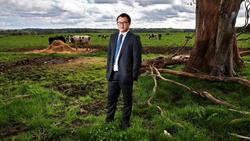
Harry Wang cuts a lonely figure standing on the Gippsland farm owned by his Chinese company Ningbo Dairy Group, as a cold winter wind slashes across the rolling green hills of Victoria’s Bass Coast (Photo: The Australian).
Dreams blocked as council cries over milk spilling to China
Harry Wang cuts a lonely figure standing on the Gippsland farm owned by his Chinese company Ningbo Dairy Group, as a cold winter wind slashes across the rolling green hills of Victoria’s Bass Coast.
The five farms near Kernot that Ningbo has bought in the past three years for $10 million are where the Chinese dairy business plans to base its new Australian arm, producing and bottling fresh milk to fly to China. But since Bass Coast Shire Council last month unanimously rejected Ningbo’s plan to house 1000 milking cows in barns and build a $6 million bottling plant on its main Glenview farm, Mr Wang says he doesn’t know what to do.
He is confounded that the council went against the recommendation of its own planning department to approve the Ningbo Dairy project as an appropriate land use. He is also disappointed the Gippsland community was so resoundingly opposed to the expansion plans — there were 430 objections — and surprised how the views of a council can overrule support by the state and federal governments. “The state government has encouraged us to be here in Victoria, and to expand dairy production and exports,” Mr Wang told The Weekend Australian .
“It seems like the national government is saying it wants foreign investment and welcomes Chinese companies here, but then when we do what they encourage us to, local councils really have more power.”
The seven-member Bass council refused Ningbo’s planning permit application, despite its own advice to the contrary, mainly on the grounds that the barn and milk-bottling shed development were “incompatible and in conflict with surrounding land use”.
The two adjoining farms of 280ha, bought by Mr Wang’s Chinese company, are both zoned for agricultural production.
The council is obliged to follow Victoria’s state planning policy framework, which decrees that agricultural development should be encouraged in Gippsland and any land-use conflicts resolved, to boost the region’s economic base.
The expansion of agricultural enterprises, including moves to more intensive animal production, are to be “supported and facilitated” as long as they are consistent with orderly planning, sustainable and don’t cause environmental degradation.
Local objections to Ningbo’s expansion, which would have trebled milk output to 30,000 litres a day, focused on potential effluent and drainage issues, the increase in the number of truck movements from one to six a day, and its impact on tourism and the landscape.
Another major area of concern expressed by objectors was that the proponents were Chinese, that the milk was to be flown direct to China, and that Chinese 457 visa workers might be imported to staff the cow barns. Other locals claimed that the fertile Gippsland area should be “a food bowl for Victoria, not China”. Animal welfare concerns also ranked highly, while some openly suggested the Chinese owners were “only interested in profit”.
Mr Wang said the Ningbo Dairy Group, which farms 20,000 cows in China and supplies milk daily to one million homes around Ningbo city, had not decided yet whether to appeal.
He said that with Australian fresh milk selling in China for $15 a litre, and demand for Australian milk powder and infant formula rampant, the economics of having an Australian dairy herd and production plant still stacked up for Ningbo.
Bass Coast mayor Kimberley Brown said foreign investment had “not been a factor” in the council’s refusal to give Ningbo the green light. She denied the seven councillors had been swayed by vociferous local opposition to go against advice.












